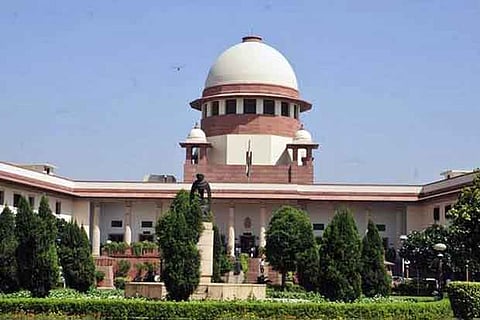

New Delhi
The Supreme Court today restrained the electronic media from showing, even in morphed form, images of the alleged victims of rape and sexual assault at a shelter home in Bihar's Muzaffarpur district, observing they cannot be compelled to "relive the trauma" again and again.
The apex court ban in which the media was also asked not to interview the victims came on a day when a state-wide bandh was called by the Left parties in Bihar to protest against the alleged sex abuse at the shelter home run by a state-funded NGO.
A bench of Justices Madan B Lokur and Deepak Gupta took cognisance of the Bihar incident and said it was a cause for serious concern that alleged victims of sexual violence were interviewed a number of times and were made to repeat the incident.
"Is this the way we are treating our girls?," the bench said and asked the media not to interview the alleged victims of sexual abuse at the shelter home while restraining them from telecasting or publishing the images of the victims even in morphed form.
"Now the probe has been handed over to the CBI. Will these girls be questioned in front of a camera? It is not easy for anybody. They have to relive the trauma. It is horrible," the bench observed and issued notices to the Centre and Bihar government seeking their responses on the incident.
"How you talk to a child is different from how you talk to an adult. I had yesterday seen a clip. You do not talk to an alleged victim of rape like this. There are different ways of talking," Justice Lokur said and questioned as to why these alleged victims should ever be interviewed like this.
Advocate Aparna Bhat, who was appointed as an amicus curiae in the matter, requested the court to give a direction that there should not be any media interview of the alleged victims.
"What about freedom of speech and expression? Media will then say that the Supreme Court is banning them," the bench said.
It referred to the recent incident in Thailand where several children, who were part of a football team, along with their coach were trapped inside a cave for several days during a group outing.
"They were not allowed to be interviewed for 15-20 days (after they came out of the cave). They only had a joint interview of all of them," the bench said.
The top court said it was "extremely disturbed" after going through the letter received from Patna-resident Ranvijay Kumar who has raised the issue of repeated interviews of the alleged victims of the Muzaffarpur incident.
The bench said it has not restrained the police authority from conducting probe and if they want to question the alleged victims, they would have to take assistance of professional counsellors and qualified child psychiatrist in consultation with National Institute of Mental Health and Neuro-Sciences in Bengaluru and Tata Institute of Social Sciences (TISS) in Mumbai.
The bench also noted that orders have been delivered by the apex court repeatedly that victims of sexual assaults should not be compelled to relive the trauma of the incident.
"In this case, there were multiple questioning and interviews and these girls were compelled to relive the trauma again and again. It is not conducive for their (victims) welfare," it said and posted the matter for hearing on August 7.
During the hearing, Bhat told the bench there has to be a protocol for interviewing minor victims of such cases.
Additional Solicitor General (ASG) Tushar Mehta, appearing for the Centre, said a minor must be insulated from any kind of such interviews.
The bench also asked whether any compensation has been given to these alleged victims.
While Bhat said that compensation scheme was there in Bihar, the ASG said, "there may be a compensation scheme but what they (alleged victims) have lost, cannot be quantified".
Bhat told the court that media reports related to the incident should not be banned but these minor girls cannot be subjected to such kind of interviews.
The ASG said nowadays parents of victims of such cases were being shown on television without even blurring their faces and it leads to disclosure of the victim's identity.
At the fag end of the hearing, the amicus said notices should also be issued to the Ministry of Information and Broadcasting and the Press Council of India in the matter.
"They will do nothing," the bench said, adding, "electronic media is not under control of the press council. Nobody is under any control".
Over 30 girls were allegedly raped at the shelter home run by one Brajesh Thakur, the chief of the state-funded NGO.
The alleged sexual exploitation of the girls was first highlighted in an audit report submitted by the TISS to the state's social welfare department in April.
An FIR was lodged against 11 people, including Thakur on May 31. The probe has now been taken over by the CBI.
In all, sexual abuse of 34 inmates out of 42 was confirmed in their medical examination, while two others who were unwell were yet to undergo medical tests.
The TISS audit report stated that many girls at the shelter home had complained of sexual abuse. A special investigation team was formed to probe the complaints.
The NGO running the shelter home in Muzaffarpur was blacklisted and the girls were shifted to shelter homes in Patna and Madhubani.
Women staff members of the shelter home and Thakur were among those who were arrested by the local police in connection with the case.
Visit news.dtnext.in to explore our interactive epaper!
Download the DT Next app for more exciting features!
Click here for iOS
Click here for Android